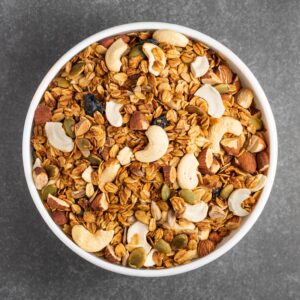 Fiber is the nutrient that your body needs but doesn’t produce naturally. You can get fiber by eating a variety of fresh fruits, vegetables, and whole grains. Fiber is important for keeping your digestive system running smoothly, lowering blood cholesterol, and keeping you full so you’re less likely to overeat. But what are some other benefits of fiber? Get ready to be impressed!
Fiber is the nutrient that your body needs but doesn’t produce naturally. You can get fiber by eating a variety of fresh fruits, vegetables, and whole grains. Fiber is important for keeping your digestive system running smoothly, lowering blood cholesterol, and keeping you full so you’re less likely to overeat. But what are some other benefits of fiber? Get ready to be impressed!
Fiber’s Role in Digestion
Fiber is a carbohydrate that cannot be broken down by enzymes in your mouth, stomach, or intestines. This means it passes through the digestive system without being digested. And this is where all of its benefits come from!
To start, fiber helps keep your digestive system running smoothly by absorbing water and moving food through the intestines more quickly. It also regulates bowel function and reduces constipation. Fiber takes cholesterol out of our body too. All of this keeps you healthy and fit!
Fiber’s Role in Weight Management
Fiber is what helps you stay full and satisfied. Fiber takes longer to digest, so it will help you feel full longer. If you are trying to lose weight, adding fiber-rich foods into your diet could be a good move. Fiber also has the ability to reduce cravings. This means that if you’re trying to lose weight, then eating foods high in fiber may help you eat less because of the satisfaction factor.
Fiber and Heart Disease
The link between heart disease and fiber has been well studied, but the USDA’s 2010 Dietary Guidelines for Americans estimate that only about 14% of adults get the recommended daily intake of fiber.
According to a study from Tufts University, people who eat a high-fiber diet are less likely to suffer from heart disease. The study found a strong correlation between a high-fiber diet and lower levels of C-reactive protein (CRP). CRP is a marker of inflammation that correlates with an increased risk of cardiovascular disease.
Fiber and Diabetes Prevention
Because fiber slows down the amount of sugar that enters your bloodstream, it’s actually effective diabetes preventative. Also, incorporating fiber into a balanced diet to help manage diabetes is a safe and effective alternative to medications. With fiber there are no chemicals and no side effects, just nature working naturally with your body.
Getting the Right Amount of Fiber for You
There are two types of fiber and each type has a different role in your body.
- Insoluble fiber: This type is found in whole grains, nuts, seeds, beans, and vegetables. It provides roughage that speeds up the passage of food and wastes through your digestive system. This can be helpful if you have irritable bowel syndrome or other intestinal disorders.
- Soft soluble fiber: This type is found in oats, barley, legumes, and other grains. It helps to lower cholesterol by binding bile acids in the intestine before they’re absorbed into the body.
Many experts recommend getting at least 25 grams of fiber per day to stay healthy and fit. But what happens if you get too much? If you consume too much fiber it can lead to bloating, constipation or diarrhea, abdominal cramping or pain, nausea or vomiting. It is also very important to drink plenty of water when consuming fiber to aid in its digestion. Otherwise, lack of water can contribute to the aforementioned symptoms. Daily recommended water intake is one-half of your body weight in ounces. For example, if you weigh 150 lbs. you should be consuming at least 75 oz of water each day.
So why do we need fiber? Fiber provides multiple benefits to your health including reducing the risk for heart disease and diabetes while also aiding weight loss efforts by keeping you full longer so you’re less likely to overeat due to hunger pains. With all of these benefits, it’s easy to see why fiber plays such an important role in maintaining a healthy lifestyle!
Find out more about our services here and don’t forget to follow us on social media!
